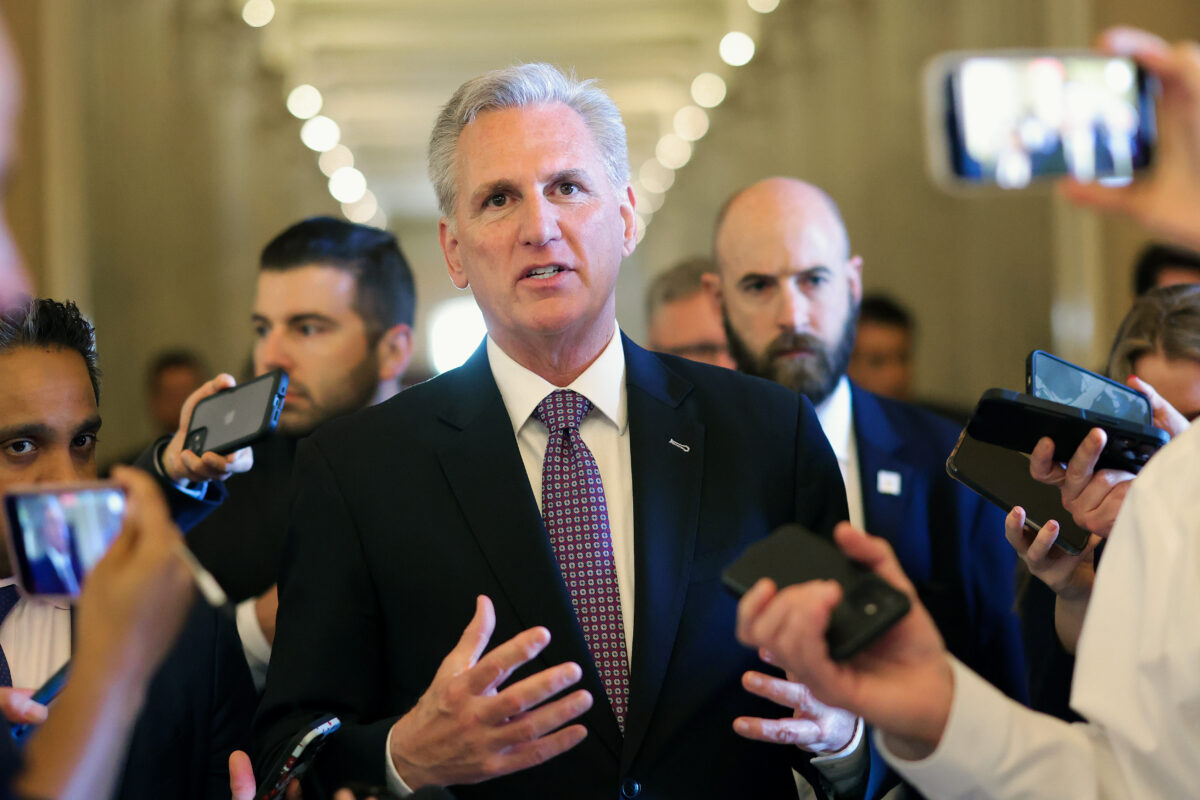Jewish community priorities remain in flux following debt ceiling deal
Jewish leaders called the bill, which staves off steeper cuts proposed by House Republicans, a positive step but said that specific funding levels for priorities are not yet settled

Photo by Win McNamee/Getty Images
U.S. Speaker of the House Kevin McCarthy (R-CA) talks to reporters at the U.S. Capitol on May 17, 2023 in Washington, DC. McCarthy and a bicameral group of Republican members of Congress held a press conference to address the current impasse over raising the nation's debt limit.
The House is set to vote Wednesday on a deal to raise the U.S. debt limit, which would also place limits on federal spending, limiting discretionary nondefense spending to 2023 levels while providing for an increase in defense spending.
Jewish community leaders called the bill, which staves off the steeper cuts initially proposed by House Republicans, a positive step, but said that specific funding levels for community priorities are not yet settled.
At stake are priorities ranging from proposals for new U.S.-Israel defense programs to security grant funding. If Congress fails to pass all 12 appropriations bills, spending levels would automatically revert to 99% of 2023 levels.
In Jerusalem earlier this month, House Speaker Kevin McCarthy (R-CA) pledged during his speech to the Knesset that funding for Israel guaranteed under the 2016 Memorandum of Understanding would be protected from cuts — although some Democrats had questioned his ability to keep that promise without specific guarantees in the original debt limit bill passed by House Republicans. They also warned that other cuts to U.S. aid in the Middle East would undermine Israeli security, even if direct aid to Israel is maintained.
“That’s all going to be resolved in the appropriations process,” Rep. Debbie Wasserman Schultz (D-FL) — who had raised alarms about funding for Israel under Republicans’ proposal — told Jewish Insider on Tuesday. “The base agreement… [doesn’t] really address the [State and Foreign Operations appropriations] bill.”
Republicans had yet to draft foreign and defense funding bills prior to the debt ceiling deal, leaving those programs further shrouded in mystery.
Rep. Lois Frankel (D-FL), who also is supporting the deal and sits on the State and Foreign Operations subcommittee, told JI, “I feel pretty good that the MOU will be honored, but that doesn’t mean there’s not going to be some really drastic cuts to the budget, at least in the House. And then we’ll see what happens. It’s not a pretty picture, but I do think Israel will be protected.”
Elana Broitman, the senior vice president of public affairs for the Jewish Federations of North America, which is prioritizing requests for additional funding for the Nonprofit Security Grant Program and the Holocaust Survivor Assistance Program, was optimistic about the chances for further growth for those programs despite the spending cap.
Broitman noted that House Republicans had already proposed a $10 million boost for the program to $315 million in their draft Homeland Security appropriations bill introduced earlier this month — short of the $55 million increase to $360 million JFNA is supporting.
“We’re continuing unabated, and we think NSGP is a really strong bipartisan program. People understand the need for it,” she told JI on Tuesday. “We’re optimistic. Obviously staying in FY23 levels is not easy, but at the same time, even in fiscal year [20]23 both of these programs had strong bipartisan support. Where Congress comes out ultimately is going to really speak to the values and priorities of both sides of the aisle.”
Broitman described the deal to freeze spending at 2023 levels, rather than cutting topline spending to 2022 levels as Republicans had proposed, as “helpful” and a positive sign that the two programs will, at minimum, not be cut below current-year levels. She continued, “I am hopeful that the $315 [million proposal for NSGP] gives us room to grow toward the original $360 [million].”
Broitman said that, assuming the debt limit bill passes as expected, the appropriations process should be able to begin in earnest.









